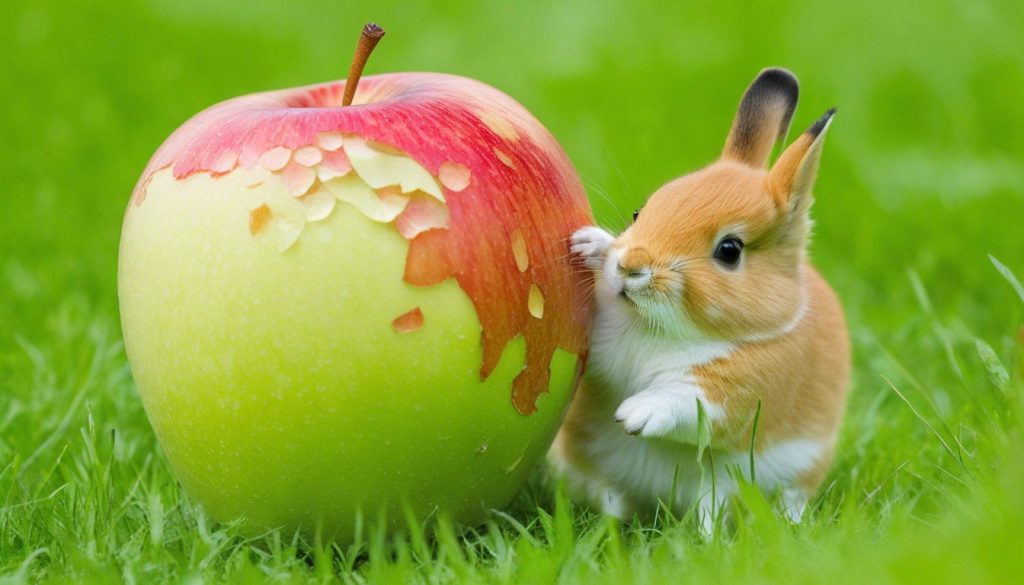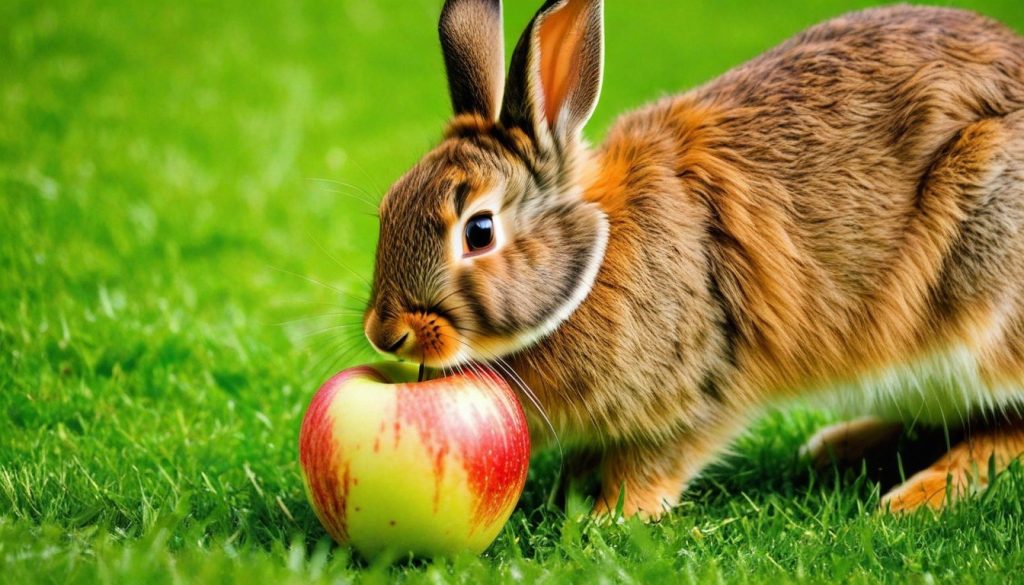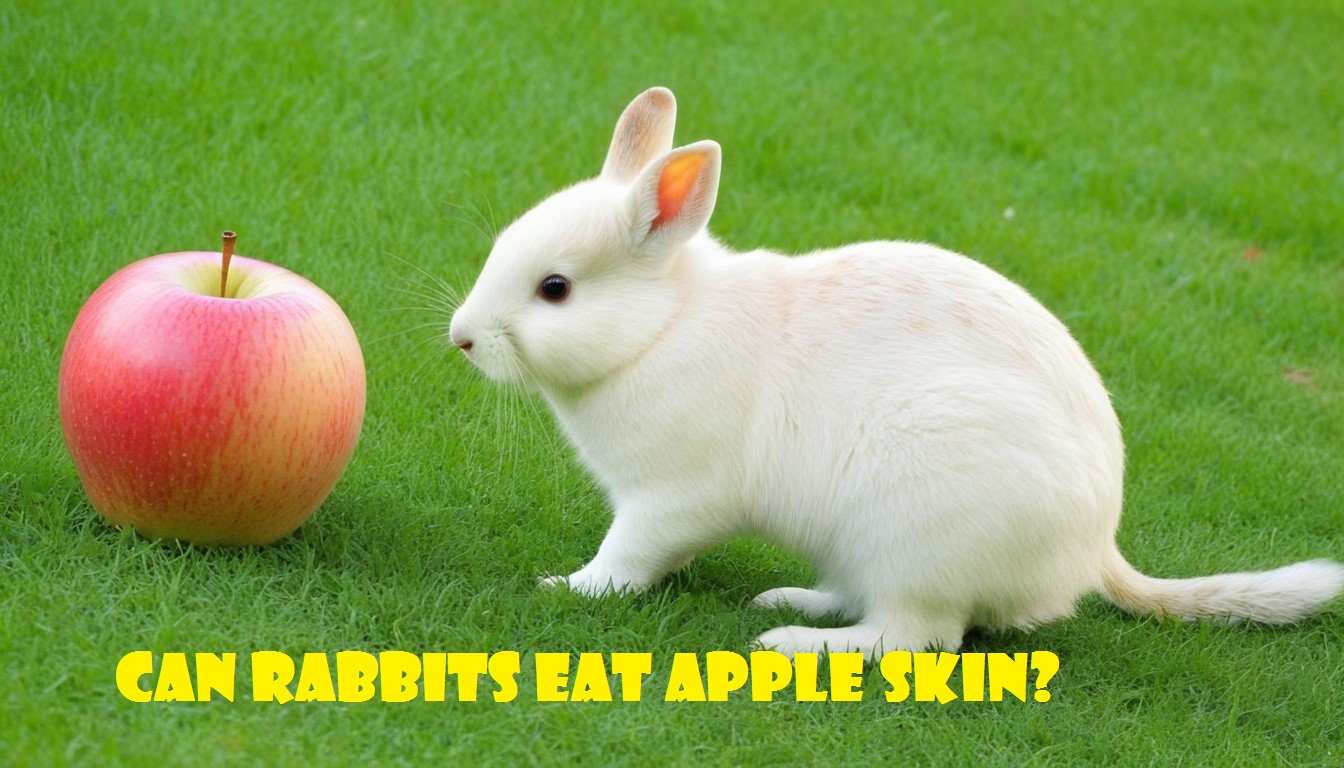Rabbits are known for their love of vegetables and fruits, but not all human foods are safe for them. One of rabbit owners’ most common questions is whether their furry friends can eat apple skin.
Apples are a popular fruit that is widely available and affordable, and it’s natural to want to share them with your pet. However, before you do so, it’s important to understand whether apple skin is safe for rabbits.
Apple skin is the outermost layer of the fruit that protects it from damage and decay. It’s a rich source of nutrients, including fibre, vitamins, and antioxidants. However, it’s also high in sugar, which can harm rabbits if consumed in large quantities. While apples are safe for rabbits, it’s important to consider the risks associated with apple skin.
In this article, we’ll explore whether rabbits can eat apple skin, its nutritional benefits and risks, and how to feed it to your furry friend safely.
Can Rabbits Eat Apple Skin?
Rabbits can safely eat apple skin in moderation. Like the fruit’s flesh, Apple skin contains essential nutrients and fibre. However, it is important to note that apple skin should only be given in small, bite-sized portions as a treat. Additionally, providing rabbits with various fruits and vegetables is important to ensure they receive a balanced diet.

Understanding Rabbit Nutrition
Rabbits are herbivores and require a diet high in fibre to maintain healthy digestion. Their unique digestive system requires them to eat various foods to meet their nutritional needs. A balanced diet for rabbits should include hay, fresh vegetables, and a limited amount of fruit.
Essential Nutrients for Rabbits
Rabbits require a diet high in fibre to maintain healthy digestion. Hay is essential to a rabbit’s diet as it provides the necessary fibre to keep their digestive system functioning properly. In addition to fibre, rabbits require various critical nutrients to maintain overall health. These include:
- Protein: Rabbits require moderate protein to maintain muscle mass and support growth.
- Vitamins: Rabbits require a variety of vitamins, including vitamin A, vitamin C, and vitamin E, to maintain healthy skin, eyes, and immune function.
- Minerals: Rabbits require a variety of minerals, including calcium, phosphorus, and potassium, to maintain healthy bones, teeth, and muscle function.
Potential Benefits of Apple Skin for Rabbits
Fiber Content
The skin of an apple is a significant source of dietary fibre. Fibre is essential for maintaining a healthy digestive system in rabbits. It aids in preventing issues like gastrointestinal stasis and promotes regular bowel movements. Including apple skin in a rabbit’s diet can contribute to the fibre intake necessary for their well-being.
Antioxidant Properties
Antioxidants are crucial in neutralizing free radicals in the body, which can contribute to ageing and various health issues. The antioxidants in apple skin may offer protective benefits for a rabbit’s overall health. However, it’s important to note that a rabbit’s primary diet should still consist of hay and fresh vegetables.
Variety in Diet
Introducing different textures and flavours into a rabbit’s diet can prevent boredom and encourage them to consume diverse nutrients. When offered in moderation, Apple skin can provide a novel and enjoyable element to a rabbit’s daily meals.
Risks and Considerations
While apple skin can offer nutritional benefits, it’s crucial to be aware of potential risks and considerations associated with feeding it to rabbits.
Pesticide Residue
Apples are often treated with pesticides, which can leave residues on the skin. Rabbits are sensitive animals, and exposure to pesticide residues can harm their health. Opt for organic apples or thoroughly wash and peel conventionally grown apples before offering them to your rabbit.
Moderation is Key
While apple skin is nutritious, it should be offered in moderation. Too much fruit, including the skin, can lead to an imbalance in a rabbit’s diet, as fruits are high in natural sugars. Excessive sugar intake can contribute to obesity and other health issues in rabbits.
Potential Choking Hazard
Rabbits may have varying preferences regarding the texture of their food. Some may enjoy nibbling on apple skin, while others may not be as enthusiastic. Always monitor your rabbit while introducing new foods to ensure they can handle the texture without the risk of choking.
Individual Sensitivities
Just like humans, rabbits can have individual sensitivities to certain foods. Before incorporating apple skin into your rabbit’s diet, observe their reactions and consult with a veterinarian if you have any concerns about potential allergies or sensitivities.

How to Introduce Apple Skin to a Rabbit’s Diet
If you offer apple skin to your rabbit, it’s essential to do so gradually and with care. Follow these steps to ensure a smooth introduction:
Wash and Peel
Thoroughly wash apples to remove any potential pesticide residues. If possible, choose organic apples. Consider peeling the apple to reduce pesticide exposure risk and make it easier for your rabbit to consume.
Cut into Small Pieces
Cut the apple skin into small, bite-sized pieces. This makes it easier for rabbits to nibble on without the risk of choking. Additionally, smaller pieces help in portion control, preventing overconsumption.
Observe Your Rabbit
Introduce the apple skin in small amounts and monitor your rabbit’s response. Watch for any signs of digestive upset, allergies, or changes in behaviour. If your rabbit reacts positively, you can continue incorporating apple skin into their diet.
Balance with Other Foods
Remember that apple skin should supplement a rabbit’s primary hay and fresh vegetables diet. Ensure a well-balanced diet to meet all their nutritional needs.
Tips for Introducing New Foods
Gradual Introduction of Apple Skin
When introducing apple skin or any new food, it’s advisable to do so gradually. This allows the rabbit’s digestive system to adjust and reduces the likelihood of adverse reactions.
Observing the Rabbit’s Reaction
Close observation of your rabbit’s behaviour and physical condition is crucial. Positive reactions indicate acceptance, while signs of discomfort or reluctance may suggest the need for adjustments.
Adjusting the Quantity Based on Acceptance
Based on the rabbit’s response, the quantity of apple skin can be adjusted. Some rabbits may enjoy it more than others, and tailoring the treat to their preferences ensures a positive experience.
How much apple can I give my rabbit?
While rabbits can eat small amounts of apples as an occasional treat, feeding them in moderation is important due to the sugar content. The natural sugars in fruits like apples can be too much for rabbits in large quantities and may lead to digestive issues or obesity.
You can offer a small slice of apple as a treat once or twice a week. Remove the seeds and core before giving it to your rabbit, as these parts can be harmful. Always introduce new foods gradually to monitor how your rabbit reacts, and if you notice any digestive upset, consult your veterinarian.
Remember that a rabbit’s primary diet should consist of hay, fresh vegetables, and high-quality rabbit pellets to ensure they receive the nutrients for a balanced diet.
Do rabbits eat raw apples?
Yes, rabbits can eat raw apples in moderation. However, it’s important to prepare the apples properly for your rabbit. Remove the seeds and core, as they contain cyanide and can be harmful. Cut the apple into small, bite-sized pieces to make it easier for your rabbit to eat.
Remember to introduce new foods gradually, monitor your rabbit’s reaction, and feed treats like apples in moderation. While apples can be a tasty and healthy occasional treat for rabbits, most of their diet should consist of hay, fresh vegetables, and high-quality rabbit pellets. Always consult your veterinarian if you have concerns about your rabbit’s diet or health.
Monitoring Rabbit’s Health
Signs of Allergies or Digestive Issues
It’s essential to observe your rabbit for any signs of allergies or digestive problems after introducing new foods. Immediate veterinary attention should be sought if any adverse reactions are noted.
Adjusting the Diet Based on Individual Rabbit Needs
Each Rabbit is unique, and their dietary needs may vary. Paying attention to individual preferences and adjusting their diet improves overall health and happiness.
Regular Veterinary Check-ups for Rabbits
Regular check-ups with a veterinarian are essential for ensuring the ongoing health of your rabbit. Discussing dietary concerns and receiving professional advice can address potential issues early on.
Why Shouldn’t Rabbits Overeat Apples?
Rabbits shouldn’t overeat apples primarily because of the high sugar content in this fruit. While small amounts of apples can be a tasty and healthy treat for rabbits, excessive consumption of sugary foods can lead to various health issues. Here are some reasons why rabbits should not overeat apples:
- Digestive Issues: Rabbits have a sensitive digestive system, and sudden or excessive sugar intake can disrupt their digestive balance. It may lead to issues like diarrhoea or an upset stomach.
- Obesity: Apples contain natural sugars, and overeating can contribute to weight gain and obesity in rabbits. Obesity is a serious health concern in rabbits and can lead to various other health problems.
- Dental Problems: The natural sugars in apples can contribute to dental issues in rabbits. Overeating sugary foods may lead to tooth decay and other dental problems, as rabbits’ teeth continuously grow, and a proper diet helps maintain dental health.
- Balanced Diet: Rabbits require a well-balanced diet primarily consisting of hay, supplemented with fresh vegetables and high-quality rabbit pellets. Treats like apples should be given in moderation to ensure they don’t replace essential components of their diet.
- Gastrointestinal Stasis: A sudden change in diet or an excessive intake of sugary foods can increase the risk of gastrointestinal stasis. In this condition, the normal movement of the digestive system slows down or stops. This is a severe and potentially life-threatening condition in rabbits.
FAQs About Rabbits and Apple Skin
Can All Breeds of Rabbits Eat Apple Skin?
Yes, Apple skin is generally safe for all breeds of rabbits. However, individual sensitivities may vary, so monitoring your rabbit’s reaction is essential.
How Often Can Apple Skin Be Included in a Rabbit’s Diet?
Apple skin can be offered as a treat 2-3 times a week. Moderation is key to maintaining a balanced diet for your rabbit.
Are There Alternative Fruits to Apple Skin for Rabbits?
Certainly! Rabbits can enjoy a variety of fruits, including banana slices, blueberries, and strawberries. Always introduce new foods gradually and monitor their response.
Can Rabbits Eat Cooked Apple Skin?
No, Rabbits should not be fed cooked apple skin. Cooking alters the texture and may introduce harmful elements. Stick to raw, fresh apple skin for your rabbit.
What Should Be Done If a Rabbit Shows Signs of Discomfort After Consuming Apple Skin?
If your rabbit displays any signs of discomfort, such as lethargy or digestive issues, consult a veterinarian promptly. It’s crucial to address any adverse reactions promptly.
Conclusion
In conclusion, rabbits can enjoy apple skin as part of their diet, provided it is introduced in moderation and with attention to potential risks. The nutritional benefits, including fibre and antioxidants, make it a healthy addition to their meals. However, responsible pet ownership involves being aware of individual sensitivities, pesticide residues, and the need for a balanced diet.
Always consult a veterinarian before making significant changes to your rabbit’s diet, and pay close attention to their reactions to new foods. With proper care and consideration, apple skin can be a delightful and nutritious treat for your rabbit, adding variety to their daily menu and contributing to their overall well-being.

